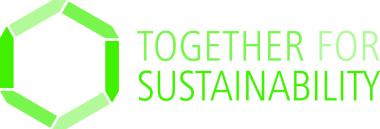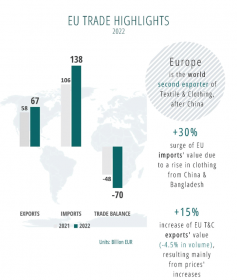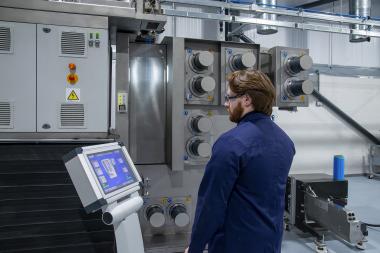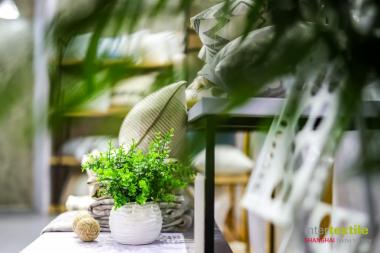NCTO: Industry roundtable discussion with key textile executives
Dr. Laurie-Ann Agama, Acting Assistant U.S. Trade Representative (USTR) for Textiles, wrapped up a three-day visit of state-of-the art U.S. textile manufacturing facilities in North and South Carolina, highlighting the importance of trade policies that bolster the competitiveness of the vibrant domestic supply chain that contributes significantly to the U.S. economy and workforce.
Dr. Agama, who advises the nation’s top trade chief on textile and apparel trade policy matters and conducts and oversees negotiations affecting textiles and apparel products, was joined by USTR textile trade officials in touring seven textile manufacturers including: Glen Raven, Barnet, Standard Textile, Parkdale Mills, Beverly Knits, Gildan, and Unifi.
Her three-day tour culminated in an industry roundtable discussion with key textile executives hosted by Unifi, in Greensboro, N.C.
U.S. textile executives spanning the fiber, yarn, fabric, and finished product textile and apparel industries participated in the roundtable and outlined critical policies, such as: the importance of maintaining the yarn forward rule of origin in the Dominican Republic-Central America Free Trade Agreement (CAFTA-DR) and other trade agreements; advancing the Miscellaneous Tariff Bill (MTB) and its importance to domestic manufacturers; closing the de minimis loophole in U.S. trade law; addressing larger systemic trade issues, particularly the use of forced labor, with China; and upholding buy American and Berry Amendment government procurement policies.
“We deeply appreciate Assistant USTR Agama’s visit to the heart of the U.S. textile industry in North and South Carolina this week to meet with U.S. textile executives and experience first-hand the breadth of the industry’s innovation, advanced sustainability practices, capital investments and critical contributions to local economies and the U.S. economy as a whole,” said Kim Glas, president and CEO of NCTO. “The three-day visit by Dr. Agama and the USTR textile team included facility tours of several NCTO member companies, all of which have made major investments in state-of-the-art manufacturing facilities that are part of a broader domestic industry supply chain that produced $65.8 billion in output in 2022 and employed 538,000 workers.”
Glas continued: “We are also grateful for Dr. Agama’s participation in the industry roundtable hosted by Unifi and substantive discussions around policy opportunities and challenges. We look forward to working closely with Dr. Agama, the USTR textile team and U.S. Trade Representative Ambassador Katherine Tai to advance policies that provide incentives for onshoring and nearshoring production and bolstering the industry’s competitiveness, while enforcing policies that address illegal trade practices that undermine this industry.”
“The U.S. textile industry has always been resilient, innovative, and a driving force of our nation’s competitiveness,” said Acting Assistant U.S. Trade Representative for Textiles Dr. Laurie-Ann Agama. “For USTR, this local engagement and conversations underscore our need to create trade policies that put workers first and promote inclusive economic growth. The spinning, knitting, and weaving operations of the textile industry are at the center of many communities across the Carolinas. This was another opportunity to hear first-hand how we trade can create jobs that allow workers, businesses, and communities to thrive.”
National Council of Textile Organizations































